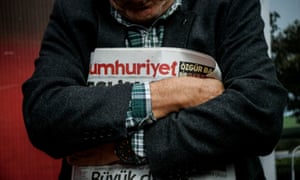
The top executive of Turkey’s most influential opposition newspaper has been detained in a crackdown in which nine other staff members have been apprehended in recent days.
Akın Atalay, the chairman of Cumhuriyet’s executive board, was taken into custody at Istanbul airport on Friday after arriving from Germany. A warrant for his arrest was issued this week and he had vowed to return to Turkey to challenge the government’s campaign against the newspaper, the last major media outlet to take an avowed opposition line against President Recep Tayyip Erdoğan.
On a recent visit to the newspaper’s headquarters in Istanbul, senior staff told the Guardian they would continue to challenge efforts to stifle them. Others with knowledge of the interrogations said the Cumhuriyet journalists were repeatedly questioned on their editorial policies and decisions, and that they faced allegations of fomenting terrorist propaganda.
Turkey has seen a widening crackdown against dissent after a mid-July coup attempt that the government says was orchestrated by followers of Fethullah Gülen, a US-based preacher with a large grassroots movement that had infiltrated the security apparatus, military and judiciary for decades.
Tens of thousands have been purged in the effort to rid the civil service and education system of alleged Gülenists, but human rights activists say those dismissals have gone beyond the proponents of the putsch to target other dissidents. Cumhuriyet, which publicly opposed the coup attempt, has criticised the crackdown as a witch-hunt.
The newspaper has repeatedly been the target of lawsuits including a case accusing its editors of revealing state secrets after a report claiming that Turkish intelligence was transporting arms to Syrian rebels under the guise of humanitarian aid. After the arrests of staff members, lawyers and board members, the government may decide to appoint a board of trustees to manage the newspaper, which would be a death knell for its independence.
Prior government takeovers of media outlets have unfolded similarly, with new management forcing a change of editorial policy that transforms them into loyalist newspapers or TV stations.
A parallel campaign has been launched by the government against media outlets and institutions that are accused of being close to Kurdish separatists fighting an insurgency in south-eastern Turkey. Last week 12 members of the People’s Democratic party (HDP) were arrested after refusing to testify in an investigation into alleged terrorism activities.
That campaign was broadened further on Friday with the arrest of five parliamentary advisers from the HDP in early morning special operations raids that the party described as “alarming”. The five individuals detained will not have access to lawyers for five days.